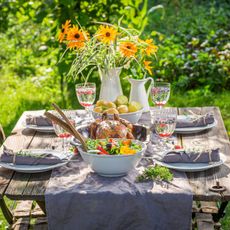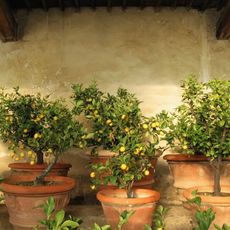Top 10 Questions About Vermiculture

Here at Gardening Know How we get lots of questions, and our goal is to provide answers to those inquiries to the best of our knowledge. Composting with worms, or vermicomposting, is a fun and easy way to utilize kitchen scraps. It is easy to start a system and perfect even for novices. The following information includes the 10 most commonly asked questions about composting with worms.
1. How do you start a worm compost?
Worms are good for more than fishing. Red wigglers are the variety most often used in worm compost but you can also use earthworms. A simple compost box for worms might be an old dresser drawer, wooden fruit box, plastic tub or really anything that will hold the food scraps and worms. Then line it with lightly moistened strips of newspaper. Fill bin 3/4 full of fluffed up strips and sprinkle an inch (2.5 cm.) of soil over the strips. Bury food scraps and add worms. Make food scraps small and avoid too much citrus and any meat, bones, or oil
2. How do you use worm castings?
Worm castings are the bi-product of the worm's digestive efforts. They are nutrient rich, break down easily and enhance any plant's health. You can opt to mix them into potting soil, side dress the veggie garden, top dress potted plants, and even sprinkle some on top of the lawn. The gentle nutrients will not burn plants. Another way to use worm castings is to make a tea. Soak castings in water and mix in a little molasses. Then place in a sprayer and spray soil and foliage.
3. All my worms in compost died. Is it still safe to use?
Worms are a natural organism that will break down over time. If all your worms in your vermicomposting bin died, obviously there was a problem, but you can still use the composted castings. There may be some small odor as a result of the decomposing worms, so avoid using the castings on indoor plants.
Gardening tips, videos, info and more delivered right to your inbox!
Sign up for the Gardening Know How newsletter today and receive a free download of our most popular eBook "How to Grow Delicious Tomatoes."
4. Is worm compost safe for containers?
Worm castings are 10 to 20 times higher in microbial activity as compared to regular potting soil. There is also a high concentration of nitrates, potassium, magnesium, calcium, and phosphorus. These beneficial nutrients are essential to plant growth. The bonus on worm castings is the gentle delivery of the nutrients. Unlike many plant foods, worm castings will not burn sensitive plant roots. Just a tiny amount of castings has been shown to boost growth in house plants. Castings also pass along pest resistance.
5. How many worms do you need for composting?
Cornell University recommends weighing the worms to determine how many you need. Red wigglers eat half their weight per day. So, if you have 2 pounds of food waste, you need 4 pounds of worms to consume and excrete that waste. But if you don't have quite that amount to start with, do not worry, as they are prodigious breeders and you will soon have plenty of worms.
6. Can worm compost get too hot?
The bin and its contents will heat up due to the presence of living creatures and the microbial activity taking place. In the summer, bins placed in full sun can get too toasty and should be moved to a cooler site. The ideal temperatures for the bin are 55-75 Fahrenheit (12-24 C.). In extreme heat, the worms can die, so keeping the bin within those temperatures will keep the compost system healthy.
7. Can you use any type of worm for vermicomposting?
There are varying opinions on the best types of worms to use. Red wigglers are the ones that most vermicomposters recommend. However, they only eat debris on the top of soil and will consume any junk found there. Earthworms are more selective and only eat organic material that is at least partially buried in soil. Earthworm castings are pre-mixed with soil and the soil is also well aerated by the worms' activity. However, either source provides nutrient-rich castings.
8. How to control bugs in vermicompost?
As long as you control temperature, do not add too much food waste, and keep that waste in small pieces that are easily consumed, you should have little problem with bugs. A bin outdoors will, of course, attract some flies. Set up a fly tape over the bin to reduce the numbers of these pests. If composting excessively sugary foods, you might see ants. Make sure you have a good balance of fruits vs. vegetables to avoid such issues.
9. Can worms eat moldy fruits and veggies?
Worms can eat any organic item; however, it may be best for the overall health of the worm composting bin to avoid such foods. The mold can contaminate the entire bin and the castings before the worms can consume the item. Following these tips on the "do's and don'ts when feeding worms" should help.
10. Will "pot worms" in compost damage plants?
When the pH has changed dramatically, or the compost bin is overly wet, tiny, threadlike white worms can appear. These are pot worms, which will feed on organic matter just like your red wigglers. However, their presence is an indicator that the compost bin is no longer providing the environment the wigglers like. If you want to keep your wigglers, you need to lower moisture a bit and increase the pH. The pot worms are not harmful and will still break down the food waste, just not as effectively as the red wigglers.
We all have questions now and then, whether long-time gardeners or those just starting out. So if you have a gardening question, get a gardening answer. We're always here to help.
-
 How To Grow Garden To Table: A Guide For Home Cooks
How To Grow Garden To Table: A Guide For Home CooksWhat could be better than a meal that comes directly from garden to table? Show off your gardening and culinary skills with the very freshest food.
By Bonnie L. Grant
-
 Want a Backyard Mini Orchard? Create Your Own Container Orchard
Want a Backyard Mini Orchard? Create Your Own Container OrchardEasier to care for in small spaces, a backyard mini-orchard makes sense for busy gardeners and juicy fruit is the reward.
By Teo Spengler